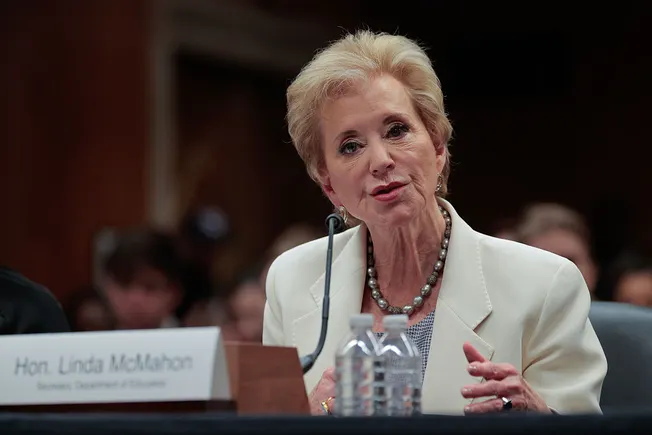Listen to the article
Dive Brief:
A group of congressional Republicans last week asked U.S. Education Secretary Linda McMahon to reverse cuts to Hispanic-serving colleges amounting to hundreds of millions of dollars.
The U.S. Department of Education announced the cuts in September, calling the programs racially discriminatory because they confer “government benefits exclusively to institutions that meet racial or ethnic quotas.”
In an Oct. 8 letter to McMahon, six members of the Congressional Hispanic Conference wrote, “These institutions do not artificially seek to meet quotas to obtain federal funds; rather, they serve the communities in which they are located.”
Dive Insight:
More than 270 Hispanic-serving institutions across 20 states would suffer under the Education Department’s plan to stop paying out federal HSI grants, according to a recent report from the Rutgers Center for Minority Serving Institutions. Federally designated HSIs are defined as those where Hispanic students make up at least 25% of the undergraduate population and at least half of students qualify for federal need-based aid.
The study estimated a collective compound loss to HSIs totaling $459 million over the remaining funding years for three programs: the Minority Science and Engineering Improvement Program, Developing Hispanic Serving Institutions and Promoting Postbaccalaureate Opportunities for Hispanic Americans.
“The effects of these cuts reach far beyond dollars, impacting educational opportunities for already underserved students,” wrote Rebecca Perdomo, a senior research associate with the Rutgers center and author of the report.
In announcing the cuts, the Education Department cited a July 25 memo from the Trump administration’s solicitor general, D. John Sauer, who cast the requirement that HSIs have at least 25% Hispanic undergraduates as a racial quota.
“The Department of Justice has determined that those provisions violate the equal protection component of the Fifth Amendment’s Due Process Clause,” Sauer wrote,invoking the U.S. Supreme Court’s 2023 ruling against race-conscious college admissions.
In the memo, addressed to House Speaker Mike Johnson, Sauer said the Justice Department would not defend the constitutionality of HSI funding — which began in the mid-1990s — in court. The memo referred to a lawsuit against the Education Department filed in June by the state of Tennessee and Students for Fair Admissions that challenges federal HSI funding as unconstitutional.
The Education Department likewise said it “agrees that the racial quotas in the HSI programs are unconstitutional” and would use “its statutory authority to reprogram discretionary funds to programs that do not present such concerns.”
The redirected funds totaled about $350 million for fiscal 2025. Less than a week later, the department announced $495 million in additional funding for historically Black and tribal colleges in what it called “a significant, one-time investment” to “support the unique and historic contributions of these institutions.”
The six Congressional Hispanic Conference members who wrote to McMahon pushed back on the administration’s argument that HSI programs are discriminatory and unconstitutional.
“For these universities and many others serving predominantly Hispanic communities, failing to meet the 25 percent undergraduate population necessary for HSI designation would mean failing to serve their communities,” they wrote. “Their eligibility is a byproduct of their mission — not a pursuit of quotas.”
The lawmakers further argued that the cuts could undermine workforce development and the country’s research capacity.
“These programs play a vital role in preparing students from HSIs for careers in STEM, developing the next generation of teachers, and advancing research in emerging fields such as artificial intelligence and advanced manufacturing,” they wrote.

























